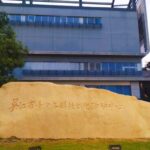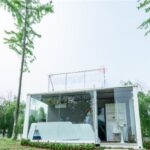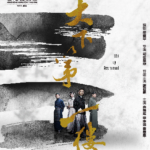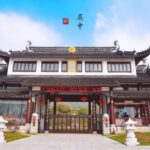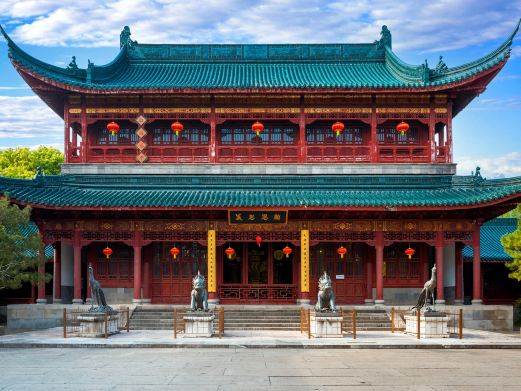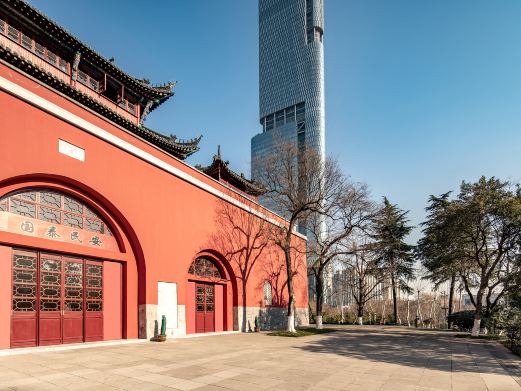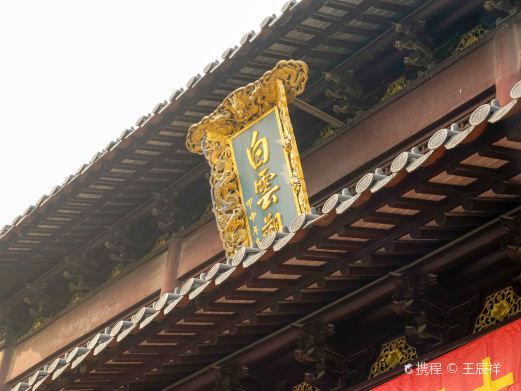Lingyan Mountain, located 15 kilometers southwest of Suzhou city center, stands at an elevation of 182 meters and is renowned for its peculiar rocks. The Lingyan Mountain Temple is said to be situated on the site of the Guanwa Palace built by King Fu Chai for his beloved Xi Shi. The Ganoderma lucidum stone in front of the Lingyan Pagoda is the origin of the mountain’s name. Every weekend, locals from Suzhou enjoy climbing the mountain to offer incense and pray for blessings at the Lingyan Mountain Temple.
There are several paths to ascend Lingyan Mountain, primarily the eastern entrance marked with ‘Lingyan Mountain Scenic Area’ and the old climbing path on Sufu Road (reaching it by following the left side of Lingyan Mountain from the eastern entrance). Upon entering the eastern gate, one finds the Lingyan Mountain Pavilion at the foot of the mountain, originally a private garden built by Bi Yuan of the Qing Dynasty, which was later destroyed in wars and has been restored in modern times. The old climbing path on Sufu Road is a favorite among locals, and it is also the path Emperor Qianlong took to climb the mountain; reaching the summit takes approximately 30 minutes. Ascending along the imperial path of Emperor Qianlong, one passes by small scenic spots such as the Ji Lu Pavilion, Ying Xiao Pavilion, and Luo Hong Pavilion. To the east of Luo Hong Pavilion lies the Yin Guang Pagoda Court, and to the west is the Xi Shi Cave, where it is said that King Gou Jian and Fan Li waited when they presented Xi Shi to King Fu Chai of Wu. Now, the cave is dedicated to Guanyin, hence also known as the Guanyin Cave. After climbing another 300 steps, one can see another famous peculiar rock of Lingyan Mountain, ‘Tortoise Watching Taihu Lake’, with footprints said to be left by Xi Shi as she often stood here gazing at her hometown. Continuing upwards, one arrives at the Lingyan Mountain Temple, which was first established in the second year of the Eastern Jin Dynasty’s Yuanxi era (AD 420), and most of the existing structures date back to the late Qing and early Republic periods. Under the abbot’s insistence, the temple only charges a symbolic entrance fee of 1 yuan, and due to their pure intentions, the temple is more revered by devotees, with a thriving incense offering. To the east of the temple stands the Lingyan Pagoda, also known as the Duo Bao Pagoda, a landmark of Lingyan Mountain, originally built in the second year of the Liang Dynasty’s Tianjian era and rebuilt in the seventeenth year of the Southern Song Dynasty’s Shaoxing era (AD 1147). The pagoda stands seven stories high, and it is said that walking around it three times clockwise can bring blessings. Don’t forget to visit the vegetarian noodle shop for a delicious bowl of vegetarian noodles. To the west of the Lingyan Mountain Temple lies a garden, commonly known as the Summit Garden, where the traces of Fu Chai and Xi Shi are more concentrated, featuring scenic spots such as the Play with Flowers Pond, Play with Moon Pond, King Wu Well, and the Stone City (a section of stone wall), as well as the Zhi Ji Well, which was repaired and dredged by the Liang Dynasty monk Zhi Ji. Note that the Lingyan Mountain Temple is not at the summit; one must climb for another 10 minutes to reach the top, where several large rocks are found, one of which is said to be the place where Xi Shi played the zither, known as the Qin Tai. Standing at the summit and looking south, one can see the Lingyan Mountain Temple and Lingyan Pagoda, and to the north, one can see Tianping Mountain, with a clear view of Suzhou city. At the southern foot of Lingyan Mountain, there is the tomb of Han Shizhong; the tomb of Qing Dynasty poet Zhang Yongfu, whose tombstone is peculiarly called ‘Tomb of the One Who Will Return’; and the Xi Shui Cai Xiang Jing, a man-made canal said to be created by King Wu of Wu with an arrow, directing palace maids to Taihu Lake to collect fragrant grass for Xi Shi.Every year around the Qingming Festival, the peonies in the Lingyan Peony Garden at the southeastern foot of the mountain are in full bloom, making it an ideal spot for photography. Visiting at other times may not be as meaningful. Lingyan Mountain is connected to the ancient town of Mudu in the east, which can be visited together. The history of the ancient town is as long as that of the ancient city of Suzhou, and there are several beautiful classical gardens in the town. The opening hours are from 08:30 to 17:00 all year round. It is advised to avoid weekends and holidays due to the large number of people climbing the mountain; also, avoid the first and fifteenth days of each lunar month as there are many people burning incense.

